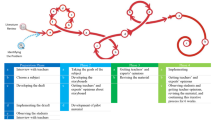Abstract
This study is devoted to issues related to one of the priority areas in education—the introduction of smart information technologies into educational process and search for new learning methods for different types of trainees. This article contains three sections: the first one describes multimedia technologies used in the learning process, their advantages, and disadvantages; the second section describes the problem of educating children with special needs, their rehabilitation and interaction with special pedagogues; the third section presents the results of a survey of children participating in the experiment, as well as the opinions of special pedagogues. In this paper, the authors analyzed literature on creation and development of educational media solutions for children and considered recommendations for developing applications for both ordinary children and children with various problems. To conduct the study, the authors developed an application that includes three groups of tasks for the child: identifying an object (what object is on the screen, what kind of object it is); name the object (as the development of speech); repeat the action (as part of the awareness of the capabilities of your body). The developed system was tested in a specialized institution of preschool education for children with special needs.
Access this chapter
Tax calculation will be finalised at checkout
Purchases are for personal use only
Similar content being viewed by others
References
Toki, E., Drosos, K., Simitzi, D.: Development of digital multimedia resources to support early intervention for young children at risk for learning disabilities. Pedagogy—Theory & Praxis 5, 129–142 (2012). Accessed April 2022 from https://www.researchgate.net/publication/262336551_Development_of_digital_multimedia_resources_to_support_early_intervention_for_young_children_at_risk_for_learning_disabilities
Lei, X., Zhang, A., Wang, B., Rau, P.-L.: Can virtual reality help children learn mathematics better? The application of VR headset in children’s discipline education, pp. 60–69 (2018)
Rahman, N., Mailok, R., Husain, N.: Mobile augmented reality learning application for students with learning disabilities. Int. J. Acad. Res. Bus. Soc. Sci. 10 (2020)
Ritakumari, S.: Educational media in teaching learning process. 8, 8 (2019). Accessed March 2022
http://www.gangainstituteofeducation.com/documents/Singh-Ritakumari.pdf
Chan, G.L., Santally, M.I., Whitehead, J.: Gamification as technology enabler in SEN and DHH education. Educ Inf. Technol. (2022)
Toasa, R., Burbano, E., Constante, A., Hidalgo, L., Morales, F.: A custom and dynamic game using gamification techniques to children from 4 to 5 years old. In: 2019 14th Iberian Conference on Information Systems and Technologies (CISTI), pp. 1–5 (2019)
Veronica, R., Calvano, G.: Promoting sustainable behavior using serious games: SeAdventure for ocean literacy. IEEE Access 8, 196931–196939 (2020)
Deterding, S., Dixon, D., Khaled, R., Nacke, L.: From game design elements to gamefulness: defining “gamification”. In: Proceedings of the 15th International Academic MindTrek Conference: Envisioning Future Media Environments, New York, NY, USA, pp. 9–15 (2011)
Ramírez Moreno, H.B., Ramírez, M.R., Rojas, E.M., del Consuelo Salgado Soto, M.: Digital education using apps for today’s children. In: 2018 13th Iberian Conference on Information Systems and Technologies (CISTI), pp. 1–6 (2018)
Rohendi, D.: Game-based multimedia for horizontal numeracy learning. Int. J. Emerg. Technol. Learn. (iJET) 14(15), Art. No. 15 (2019)
Dattolo, A., Luccio, F.L.: A review of websites and mobile applications for people with autism spectrum disorders: towards shared guidelines. In: Gaggi, O., Manzoni, P., Palazzi, C., Bujari, A., Marquez-Barja, J.M. (eds.) Smart Objects and Technologies for Social Good, vol. 195, pp. 264–273. Springer International Publishing, Cham (2017)
Rapid Application Development (RAD) Model: An Ultimate Guide For App Developers in 2022, Low-code, Sep. 05, 2021. Accessed March 2022 from https://kissflow.com/low-code/rad/rapid-application-development/
Web Speech AP. Mozilla Corporation. Accessed April 2022 from https://developer.mozilla.org/en-US/docs/Web/API/Web_Speech_API
Teachable Machine. Google Corp. Accessed April 2022 from https://teachablemachine.withgoogle.com/
Author information
Authors and Affiliations
Corresponding author
Editor information
Editors and Affiliations
Rights and permissions
Copyright information
© 2023 The Author(s), under exclusive license to Springer Nature Singapore Pte Ltd.
About this paper
Cite this paper
Prokofyeva, N., Katalnikova, S., Ziborova, V., Semrjakovs, A. (2023). Possibilities of Using Multimedia Technologies in the Learning Process for Children with Special Needs. In: Uskov, V.L., Howlett, R.J., Jain, L.C. (eds) Smart Education and e-Learning—Smart University. KES-SEEL 2023. Smart Innovation, Systems and Technologies, vol 355. Springer, Singapore. https://doi.org/10.1007/978-981-99-2993-1_5
Download citation
DOI: https://doi.org/10.1007/978-981-99-2993-1_5
Published:
Publisher Name: Springer, Singapore
Print ISBN: 978-981-99-2992-4
Online ISBN: 978-981-99-2993-1
eBook Packages: Intelligent Technologies and RoboticsIntelligent Technologies and Robotics (R0)




